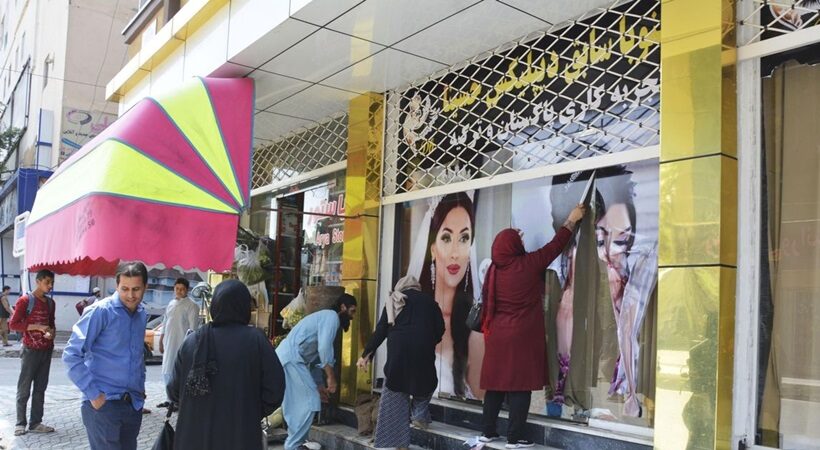For an entire generation of women in Afghanistan, this could be the beginning of years of oppression and fear. People from progressive countries might not even be able to wrap their heads around the fact that women in Afghanistan are not allowed to enter schools, work, step out of their homes without a male relative to escort them, and keep their faces uncovered.
Women who ever dared to deny these rules suffered public beatings and executions at the hands of the Taliban. Some days ago, a young woman was shot dead by the Taliban for wearing tight clothes and not being accompanied by a male relative in Afghanistan’s northern Balkh province.
In a recent Facebook post by Afghan-American author Khaled Hosseini, who has been doing the rounds on social media, he wrote about his first cousin who lives in Western Afghanistan’s Herat. When Hosseini phoned her amid the clashes in Afghanistan, she expressed fear for her life.
“I felt heartbroken, helpless. I worry for my cousin. And I worry for the millions of Afghans who have fled home and are wrestling with existential questions. Where will they go? What will happen to them? No one can say for sure. But I worry the most about my fellow Afghan sisters. Women and girls stand to lose more than any other group,” Hosseini wrote.
Some final goodbyes were said as university lecturers gathered their female students for what they believe is last. When girls showed up at their universities in Herat, they were turned away.
However, one business is booming, now more than ever. The burqa has now become a must-have item. The dark-coloured garments covering a woman from head to toe, which hides not just her body but her identity, are now essential for all households where women live.
“There are many lasting horrific images from the last time the Taliban ruled Afghanistan: the public beatings, the cutting off of hands, the executions inside stadiums, the barbaric and senseless destruction of historical artefacts. But for me, the lasting mental picture of the Taliban circa 1990s is that of the stick holding Talib beating a burqa-clad woman. The Taliban systematically terrorized women. They took away their freedom of movement, their freedom to work, their right to education, their right to wear jewellery, to grow their nails or paint them, to laugh in public, to even show their faces,” wrote Hosseini.
Read More: As Afghan Women Pick Up Arms, A Thousand Splendid Suns Shine On The Roofs
Multiple reports, although unconfirmed, suggest that girls and women above the age of 15 and under 45 are being forced into marrying Taliban fighters in the Badakhshan and Takhar regions of the country.
“Is that what is in store for my cousin? For her daughter? And the countless brave Afghan women who for twenty years labored to achieve some measure of autonomy, dignity, and selfhood? Are Afghan women once again to be sequestered inside homes? Will they be beaten in the streets? Will women no longer be allowed to work? Will girls’ classrooms sit empty? Will female faces disappear from Afghan TV and female voices from radio? Will Afghanistan be deprived once more of meaningful contribution from half of its population?” Hosseini said.
Ever since peace talks between the Taliban and the Afghan government began, women have been warning that they would be affected the most. They are now looking for a lifeline, but their cries are going unheard.
According to the United Nations High Commissioner for Refugees (UNHCR), some 80 people of about a quarter of a million Afghans forced to flee since the end of May are children and women.
“The American decision has been made—and the nightmare that many Afghans, including myself, feared is in the process of unfolding before our eyes. Still, as bleak and hopeless as things may seem now, the world cannot and must not forget Afghanistan. It must not abandon a people that have searched for peace for over four decades. The world must stand in solidarity with ordinary Afghans, especially women and girls, and take steps necessary to pressure the Taliban into respecting their essential human rights –assuming, safely it seems, that the Taliban will soon control the entire nation,” Hosseini wrote.
“The world must do what it can to make sure millions of Afghan women are not once again made to languish behind locked doors and pulled curtains. Those women are some of the bravest and most resilient people I have ever come across. My cousin is a shining example. Women like her have inspired and humbled me over and over. It is a disgrace that they should suffer yet again, after all that they have endured already for many long years of hardship and struggle,” he added.
Across the country, the Taliban have taken control of numerous districts. As per US intelligence assessments, the country’s civilian government could fall to the terror group within months of the withdrawal of US forces.



















